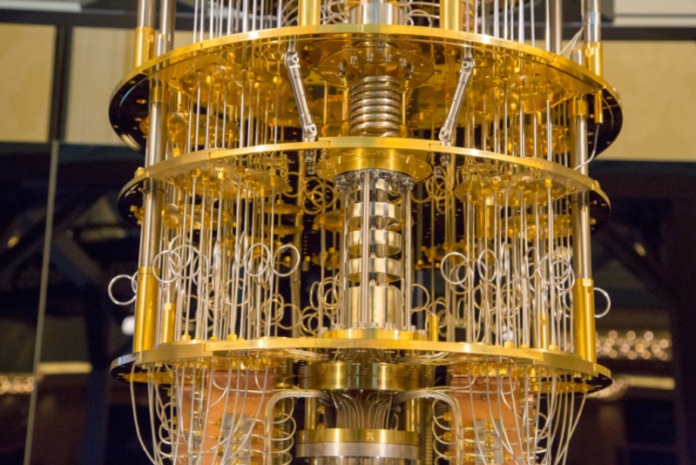By Jeph Ajobaju, Chief Copy Editor
Germany, the power house of European economy, has launched an extraordinarily powerful computer that uses subatomic particles to make millions of calculations in microseconds.
That makes Germany, already Europe’s most technologically advanced nation, a contender in the global race to develop the next-generation technology called quantum computing.
“As far as research into quantum technologies is concerned, Germany is among the best of the world, and we intend to remain amongst the best of the world,” German Chancellor Angela Merkel – herself a quantum chemist – said during at the launch.
“We’re in the midst of a very intense competition, and Germany has the intention to have an important say,” per Politico.
Definition of quantum computing
NewScientist defines Quantum computers are machines that use the properties of quantum physics to store data and perform computations.
This can be extremely advantageous for certain tasks where they could vastly outperform even our best supercomputers.
Classical computers, which include smartphones and laptops, encode information in binary “bits” that can either be 0s or 1s. In a quantum computer, the basic unit of memory is a quantum bit or qubit.
Qubits are made using physical systems, such as the spin of an electron or the orientation of a photon. These systems can be in many different arrangements all at once, a property known as quantum superposition.
Qubits can also be inextricably linked together using a phenomenon called quantum entanglement. The result is that a series of qubits can represent different things simultaneously.
For instance, eight bits is enough for a classical computer to represent any number between 0 and 255. But eight qubits is enough for a quantum computer to represent every number between 0 and 255 at the same time.
A few hundred entangled qubits would be enough to represent more numbers than there are atoms in the universe.
This is where quantum computers get their edge over classical ones.
In situations where there are a large number of possible combinations, quantum computers can consider them simultaneously. Examples include trying to find the prime factors of a very large number or the best route between two places.
However, there may also be plenty of situations where classical computers will still outperform quantum ones. So the computers of the future may be a combination of both these types.
For now, quantum computers are highly sensitive: heat, electromagnetic fields and collisions with air molecules can cause a qubit to lose its quantum properties.
This process, known as quantum decoherence, causes the system to crash, and it happens more quickly the more particles that are involved.
Quantum computers need to protect qubits from external interference, either by physically isolating them, keeping them cool or zapping them with carefully controlled pulses of energy. Additional qubits are needed to correct for errors that creep into the system.
Europe in race against US, China for quantum
Europe, the United States and China are locked in competition over who can build and exploit the most powerful computers, according to Politico.
Quantum technology, while still in its infancy, promises to carry out previously impossible calculations at record speed. Germany hopes that quantum computing will spur innovation across industry – from transport and the environment to health.
While traditional computers process “bits” of information that have the value 1 or 0, known as a binary code, quantum computers are able to process bits that can be 1 and 0 simultaneously, mirroring subatomic particle behavior.
These quantum bits, also known as qubits, can run calculations much, much faster.
Policymakers hope the tech will bring an economic windfall when applied to the economy. Self-driving cars, for example, could learn to drive more safely, and faster.
The tech also promises to be able to crack sophisticated encryption.
Benefits of quantum research accrue to countries that can host and use devices. Germany’s computer, located near Stuttgart, is being built by US tech company IBM and will be managed by Fraunhofer-Gesellschaft, Europe’s leading organization for applied research.
Researchers and companies will be able to develop and test their quantum algorithms and gather expertise by using the computer.
Merkel’s interest in the tech underscores the stakes for Germany and other European countries who are trying to build up a local tech sector and wean themselves off foreign providers.
Though IBM’s participation in the program highlights that even Germany isn’t there yet.
Sovereignty not isolation
With few leading European quantum companies, IBM is providing both the computer itself, and the cloud it’s connected to.
Last year, Berlin announced a €2 billion investment in quantum over five years, and it can also tap into European Commission’s €1 billion fund for quantum technologies.
Still, Merkel acknowledged that Europe’s behind and needed to catch up.
“Quantum computing can play a … key role in our endeavour to acquire technological and digital sovereignty,” she said. “Of course we’re not the only ones to realize that this is the case. The United States and China been fully invested enormous amounts of money.”
The US and China currently hold the most patents on quantum computers and technology. The Chinese government reportedly spends at least $2.5 billion a year on quantum research.
In 2018, Washington earmarked $1.2 billion for quantum research as part of its National Quantum Initiative Act. The federal government topped up the funding with other initiatives including $237 million in the 2021 budget.
Both countries can also count on their tech giants including Alibaba, IBM and Microsoft.
Amid tense discussions in Europe over who controls industrial data, Fraunhofer-Gesellschaft, the research institute, will store and process the data produced by the computer IBM’s data centers in Germany.
“Orders will be sent to the quantum computer and can be further processed in traditional computers for data privacy and sovereignty, the quantum computer will be operated under German law,” said Reimund Neugebauer, president of Fraunhofer-Gesellschaft at the launch.
He said the institute has already concluded partnerships with companies and universities that will use the computer, but did not name them.
German Minister for Research Anja Karliczek said: “Building up this ecosystem is a very important question for security and sovereignty.
“We also want to develop the hardware for quantum computing here in Germany, and I would like to emphasise that sovereignty doesn’t mean we should isolate ourselves.”







